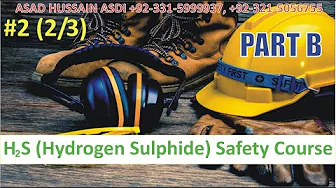IASP / NASP Compressed Gas Safety Course In Pakistan (Rawalpindi, Peshawar)
IASP / NASP Compressed Gas Safety Course
In the realm of occupational safety, few hazards are as prevalent and potentially dangerous as compressed gases. Whether used in laboratories, industrial settings, or medical facilities, the handling and storage of compressed gases require specialized knowledge and safety measures to mitigate risks effectively. Recognizing the critical need for comprehensive training in this field, the International Association for Safety Professionals (IASP) and the National Association of Safety Professionals (NASP) have collaborated to offer the Compressed Gas Safety Course.
Course Benefits:
The IASP/NASP Compressed Gas Safety Course is designed to equip participants with a deep understanding of the properties, hazards, and safe handling practices associated with compressed gases. By undertaking this course, individuals can expect to:
-
Enhance Workplace Safety: The foremost benefit of this course is its contribution to fostering a safer work environment. Armed with knowledge about the hazards of compressed gases and the necessary safety protocols, participants can minimize the risk of accidents, injuries, and property damage.
-
Regulatory Compliance: Compliance with regulatory standards is paramount in industries where compressed gases are utilized. This course ensures that participants are well-versed in relevant regulations and guidelines, thereby helping organizations maintain compliance and avoid penalties.
-
Risk Management: Compressed gases pose various risks, including fire, explosion, and asphyxiation. Through this course, participants learn how to identify, assess, and mitigate these risks effectively, thus bolstering risk management efforts within their organizations.
-
Skill Development: From understanding gas properties to implementing safe handling procedures, participants acquire a range of practical skills essential for working with compressed gases. These skills are transferable across various industries and can enhance career prospects.
-
Confidence and Competence: Armed with comprehensive knowledge and skills, course graduates gain confidence in their ability to handle compressed gases safely. This confidence translates into greater competence and efficiency in performing job responsibilities.
Study Units:
The IASP/NASP Compressed Gas Safety Course comprises several study units, each covering essential aspects of compressed gas safety. Some of the key study units include:
-
Introduction to Compressed Gases: This unit provides an overview of compressed gases, their properties, and common applications across industries.
-
Hazards and Risks: Participants learn about the various hazards associated with compressed gases, including flammability, toxicity, and pressure-related risks.
-
Storage and Handling: This unit focuses on safe storage practices, handling procedures, and equipment considerations for different types of compressed gases.
-
Emergency Response: Participants are trained to respond effectively to compressed gas emergencies, including leaks, spills, and accidents, to minimize harm and mitigate further risks.
-
Regulatory Compliance: Understanding regulatory requirements is crucial for ensuring legal compliance and maintaining safety standards. This unit familiarizes participants with relevant regulations and guidelines governing compressed gas use.
-
Safety Management Systems: Participants learn about the importance of safety management systems in mitigating risks associated with compressed gases and promoting a culture of safety within organizations.
Learning Outcomes:
Upon completion of the IASP/NASP Compressed Gas Safety Course, participants can expect to achieve the following learning outcomes:
- Demonstrate an understanding of the properties and hazards of compressed gases.
- Implement safe storage, handling, and transportation practices for compressed gases.
- Identify and assess risks associated with compressed gas use and develop strategies for risk mitigation.
- Respond effectively to compressed gas emergencies, including leak containment and evacuation procedures.
- Interpret and comply with relevant regulatory standards and guidelines governing compressed gas safety.
- Foster a culture of safety within their organizations through the implementation of best practices and safety management systems.
Who is This Course For:
The IASP/NASP Compressed Gas Safety Course is suitable for a wide range of professionals working in industries where compressed gases are utilized. This includes:
- Laboratory Technicians and Researchers: Individuals working in research laboratories, pharmaceutical facilities, and academic institutions where compressed gases are commonly used in experiments and processes.
- Industrial Workers: Professionals employed in manufacturing, construction, and maintenance industries where compressed gases are utilized for various purposes, such as welding, cutting, and pneumatic applications.
- Healthcare Professionals: Personnel working in hospitals, clinics, and medical facilities where medical gases are administered for patient care and treatment.
- Safety Managers and Consultants: Safety professionals responsible for implementing and overseeing safety programs within organizations, with a focus on managing risks associated with compressed gases.
Future Progression:
The IASP/NASP Compressed Gas Safety Course serves as a solid foundation for individuals seeking to further their knowledge and expertise in compressed gas safety. Graduates of this course may pursue advanced certifications, such as Certified Compressed Gas Safety Professional (CCGSP), offered by professional organizations specializing in occupational safety. Additionally, continuing education and training opportunities, workshops, and seminars can help participants stay updated on emerging trends, technologies, and best practices in compressed gas safety.
In conclusion, the IASP/NASP Compressed Gas Safety Course stands as a valuable resource for individuals and organizations committed to promoting safety and mitigating risks associated with compressed gases. By offering comprehensive training on the properties, hazards, and safe handling practices of compressed gases, this course equips participants with the knowledge and skills necessary to enhance workplace safety, achieve regulatory compliance, and minimize risks effectively. With its focus on practical application and real-world scenarios, the course prepares participants to tackle the challenges of working with compressed gases confidently. As industries continue to evolve, embracing advancements in technology and safety practices, the demand for skilled professionals in compressed gas safety is likely to grow, making this course a pertinent investment in career development and organizational excellence.
****** For Registration & Information ******
For Free Video Lectures Click Here











